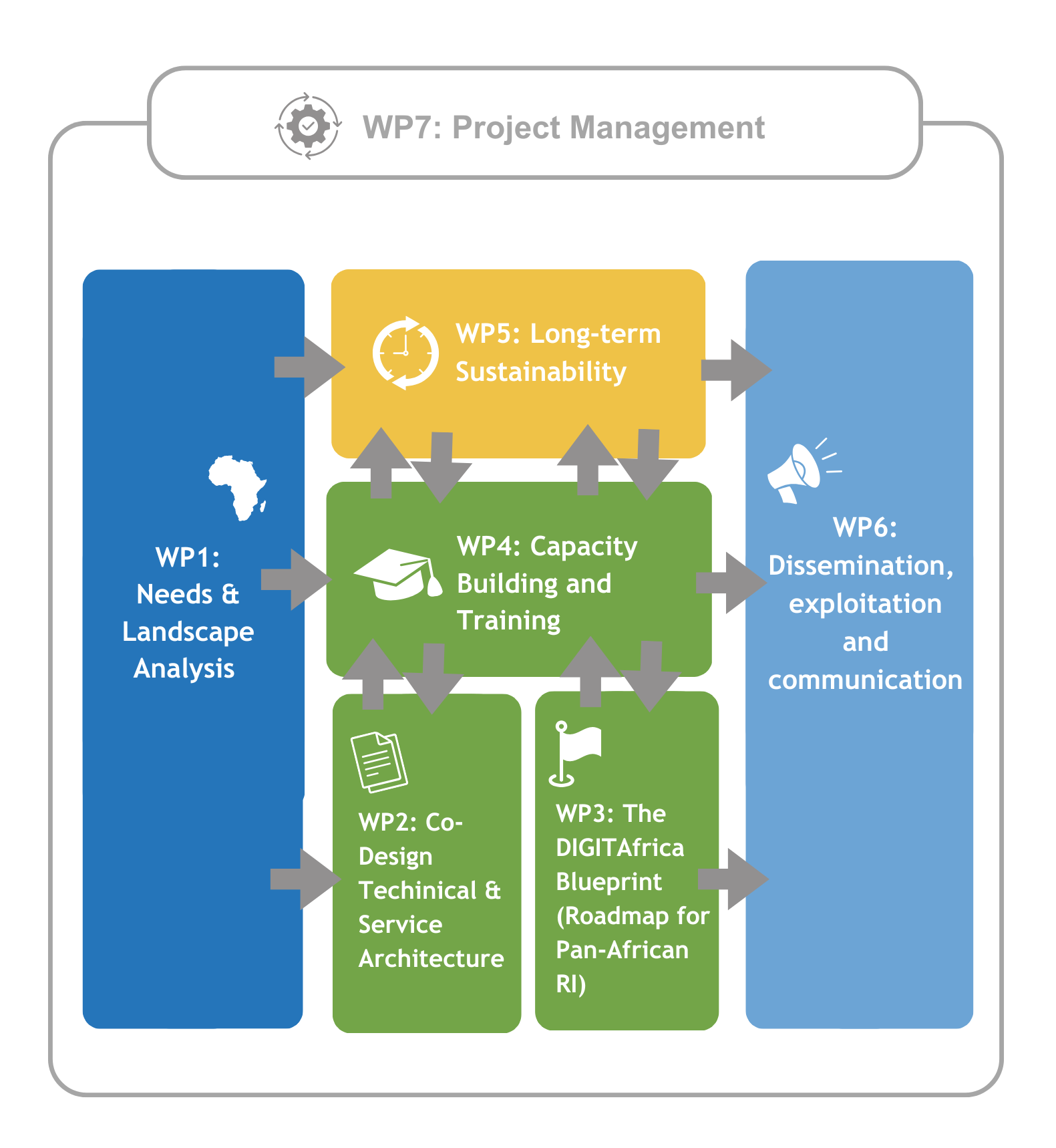Work Packages
The project is structured into seven Work Packages designed to address complementary tasks and activities throughout its duration. Together, they ensure a coherent progression from identifying community needs and existing gaps, to designing and advancing the core services of the research infrastructure, while in parallel establishing strong capacity-building and educational foundations. These efforts are supported by dedicated work on long-term sustainability, as well as communication, dissemination, and exploitation activities that maximise the project’s impact. The overall coordination and management framework ensures smooth implementation and effective collaboration across all partners.
The diagram illustrates this organisational structure. Further information on each Work Package, including their objectives and lead institutions, is provided in the sections that follow.

- WP1: Needs and Gaps
- WP2: Initial Design and Deployment
- WP3: African RI Blueprint
- WP4: Capacity Building and Training
- WP5: Sustainability
- WP6: Dissemination, Exploitation and Communication
- WP7: Project Management
- Lead: Consiglio Nazionale delle Ricerche (CNR), Italy and Université de la Manouba (Tunisia).
- Objectives: This work package aims to identify the gaps and needs in African research infrastructures through consultations and workshops. By understanding existing capacities and shortcomings, the project can better tailor its interventions.
- Key Tasks:
- Task 1.1: Consultation Workshops to Engage Stakeholders. Leader: CNR.
- Task 1.2: Analysis of RI capacities in Africa. Leader: UMA
- Task 1.3: Identification of relevant research communities in Africa in Digital Sciences. Leader: UCAD.
- Task 1.4: Analysis of RI services needs at multiple scales and contexts in Africa. Leader: CNR
- Lead: INRIA, France and University of Cape Town, South Africa
- Objectives: To develop a comprehensive framework and deployment strategy for the digital infrastructure, ensuring a solid foundation for the project’s success.
- Key Tasks:
- Task 2.1: Requirements gathering and definition/validation of needed services. Leader: UCT.
- Task 2.2: Link with the GreenDIGIT project to lower the environmental impact. Leader: UvA.
- Task 2.3: Initial Design. Leader: STR.
- Task 2.4: Proof of concept deployment. Leader: INRIA.
- Lead: University of Thessaly (UTH), Greece and Université Cheikh Anta Diop de Dakar, Senegal (UCAD).
- Objectives: To finalise the blueprint for a pan-African research infrastructure that incorporates best practices for open data, reproducibility, and sustainability.
- Key Tasks:
- Task 3.1: BluePrint of an African RI. Leader: UTH.
- Task 3.2: Testing the concept of the BluePrint. Leader: UN.
- Task 3.3: Data management and reproducibility. Leader: UvA
- Task 3.4: BluePrint assessment and lessons learned
- Lead: Universiteit van Amsterdam (UvA), Netherlands and Strathmore University (Kenya)
- Objectives: To strengthen research capacity across African institutions by providing targeted training programs and promoting inclusivity in digital sciences.
- Key Tasks:
- Task 4.1: Identification of the priority needs. Leader: STR.
- Task 4.2: Articulation with the SLICES/SoBigData Academy and TheNetworkingChannel. Leader: SU.
- Task 4.3: Training courses, workshops, and winter/summer schools. Leader: UvA.
- Task 4.4: Qualifications and micro-credentials. Leader: SU.
- Lead: Sorbonne Université (SU), France and Université de la Manouba (MA), Tunisia.
- Objectives: To ensure the long-term sustainability of the project through strategic planning and the establishment of a pan-African research network.
- Key Tasks:
- Task 5.1: High-level policy liaison and funding concept. Leader: BSC.
- Task 5.2: Proposition of a common research agenda. Leader: CNR.
- Task 5.3: Design study for an EU-African DIGIT RI. Leader: UMA.
- Task 5.4: DIGITAfrica MoU. Leader: SU.
- Lead: Mandat International (MI), Switzerland and Université de Ngoundéré (UN), Cameroon.
- Objectives: To effectively communicate the project’s progress and results to stakeholders and the wider public through various channels.
- Key Tasks:
- Task 6.1: Communication and Dissemination Activities. Leader: MI.
- Task 6.2: Liaison with Regional Authorities and Recommendations. Leader: UN.
- Task 6.3: Synergies and Dialogue with the Civil Society and Industry. Leader: MI.
- Lead: Sorbonne Université (SU), France
- Objectives: To ensure efficient coordination and management of the project, covering financial oversight, risk management, and reporting requirements.
- Key Tasks:
- Task 7.1: Scientific and technical coordination.
- Task 7.2: Administrative project management
- Task 7.3: Contractual and legal management
